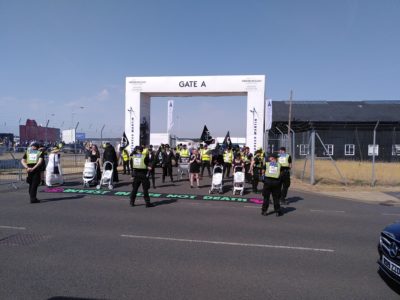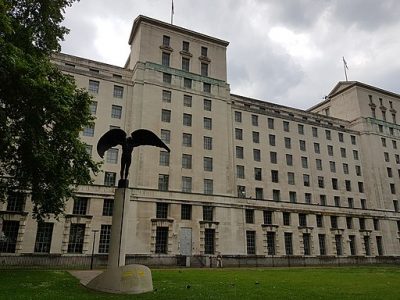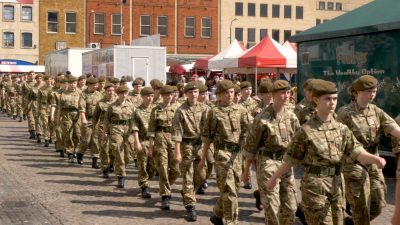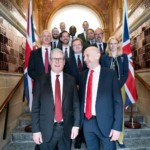Scottish Parliament recognises child rights and welfare concerns around armed forces activities in schools
ForcesWatch and Quakers in Scotland press release
After two years of deliberation of the petition calling for greater scrutiny, guidance and consultation around armed forces visits to schools in Scotland, MSPs have published a report this morning.(2)
Holyrood’s Public Petitions Committee have made a number of recommendations that recognise concerns of the petitioners and supporters of the petition, including child rights organisations.(3)
These include commissioning a Child Rights and Wellbeing Impact Assessment around appropriateness of content and balance, both within presentations made by the armed forces and within the wider curriculum. They indicated that the CRWIA should consider the the issue of consultation with parents.
The Committee also recommended that careers information provided to young people should reflect the challenges and risks involved in an armed forces career, so that they are fully informed.
In a bid to enable better scrutiny of the activities, the Committee recommended that data about the visits should be made publicly available by the Ministry of Defence.
The MoD and the armed forces gave oral evidence to the Committee in which they stated that their engagement with young people in schools had ‘matured’ since 2014.(4) The petitioners contested this and a number of points made in the evidence and requested further information. (5)
New data published in 2017 shows a continuing high level of visits to schools, with some schools visited repeatedly, and most visits for careers purposes.(6)
The report reflects difference of opinion around whether armed forces activities in schools are about recruitment or raising awareness. The Committee was not able to conclude that ‘such activities constitute an explicit act of recruitment‘ but they did state that the activities include the promotion of careers in the armed forces and ‘form part of the recruitment journey‘.
In 2015, the Welsh Assembly accepted recommendations for guidance around armed forces careers activities in schools which reflected the ‘unique nature’ of their careers. (7)
Emma Sangster of ForcesWatch stated that, “We are very pleased that the Committee has recognised the underlying concerns of this petition and assessed it in terms of children’s rights, in line with the Scottish government’s established practice.(8)
“We hope that the assessment will also consider some points of particular concern, such as visits to primary and special schools, and take a detailed look at the materials and activities across the range of armed forces visits to schools.
“There is clearly a strong recruitment aspect to military visits in schools across Scotland. The Committee itself has noted this, saying visits ‘form part of the recruitment journey’. We are pleased that it has been recognised and call for greater oversight of recruitment in schools.”
Mairi Campbell-Jack, Scottish Parliamentary Engagement Officer for Quakers in Britain, said: “Quakers are led by their beliefs to be concerned about the increasing militarisation of society and and our education system.
“We are delighted that the committee has recognised our concerns and welcome the call for the Scottish Government to undertake a Child Rights Impact Assessment which we urge the Scottish Government to undertake. We would like to thank the Committee and its staff, who worked for a long time in consideration of this issue.”
Juliet Harris of Together: Scottish Alliance on Child Rights, said, “The UN has repeatedly raised concerns at the age at which children are recruited to the armed service across the UK, and that children from vulnerable groups are disproportionately represented among new recruits.
“We welcome the call from the Public Petitions Committee for the Scottish Government to carry out a child rights impact assessment on military visits to schools and hope that this is the first step towards the UK meeting its wider obligations to children’s human rights.”
DETAILS
The report is available at https://digitalpublications.parliament.scot/Committees/Report/PPC/2018/6/4/PE1603–Ensuring-greater-scrutiny–guidance-and-consultation-on-armed-forces-visits-to-schools-in-Scotland#Introduction
Further information relating to petition PE01603 can be found at http://www.parliament.scot/GettingInvolved/Petitions/armedforcesvisitstoschools
For more information and media enquiries contact:
ForcesWatch – 020 7837 2822 or 07752 304113 or email press@forceswatch.net
Quakers in Scotland – Anne van Staveren, Media Relations Officer – 020 7663 1048, 07958 009703, annev@quaker.org.uk
NOTES
1. ForcesWatch scrutinises armed forces recruitment practices and proposes changes in policy aimed at better serving the interests of young people. See http://www.forceswatch.net
Quakers’ commitment to equality, justice, peace, simplicity and truth challenges them to seek positive social and legislative change. For information about Quakers in Scotland see http://quakerscotland.org/
2. Petition PE01603 asks for greater scrutiny, guidance and consultation on armed forces visits to schools in Scotland. For a summary see https://www.forceswatch.net/content/petition-faqs
3. Submissions supportive of the petition were made by the Scottish Youth Parliament, the Children and Young People’s Commissioner, Together (Scottish Alliance on Child Rights) called for a Child Rights Impact Assessment to be made, Connect (formerly the Scottish Parent Teacher Council), and the Catholic Church, amongst others.
The report, background information and oral and written evidence can be found at: http://www.parliament.scot/GettingInvolved/Petitions/armedforcesvisitstoschools
4. See oral evidence by the MoD and armed forces: http://www.parliament.scot/parliamentarybusiness/report.aspx?r=11433&mode=pdf
Oral evidence was also given by the Deputy First Minister: http://www.parliament.scot/parliamentarybusiness/report.aspx?r=10904&i=99739#ScotParlOR
5. See the final submission from the petitioners: http://www.parliament.scot/S5_PublicPetitionsCommittee/Submissions%202018/PE1603_HH.pdf
6. During 2016-17, 770 visits were made by the armed forces to schools in one year, including a small number to primary schools and special schools. 68% of state secondary schools were visited in one year, some many times with three quarters (75.5%) of visits are promoting a career in the armed forces. See ‘Armed forces visits to schools in Scotland: An update for 2016-2017; (ForcesWatch, 2017), https://https://www.forceswatch.net/wp-content/uploads/armed_forces_visits_schools_Scotland_2016-17.pdf
7. The recommendations accepted by the Welsh Government:
1. That the Welsh Government would review ‘the Careers and the World of Work Curriculum framework to ensure that guidance in relation to inviting the armed forces into schools take account of their unique natures as a career and the need to encourage an open and honest exchange of views with pupils about their role.’
2. That the Government works to get a greater range of employers visiting schools in Wales, after it emerged that the armed forces visit schools more often than most emergency services – and more often than all of them when focusing on just careers-focused visits – and possibly more than other public and private sector employers (data on these latter are not available).
3. That further research might be needed into the ‘reasons for the apparently disproportionate numbers of visits to schools in areas of relatively high deprivation’.
See http://www.assembly.wales/en/bus-home/pages/rop.aspx?meetingid=3432&language=en&assembly=4&c=Record%20of%20Proceedings#C239296
8. For details of the Scottish Government’s policy on children’s rights, see https://beta.gov.scot/policies/human-rights/childrens-rights/
See more: military in schools/colleges, Scotland, Scottish Parliament, education










